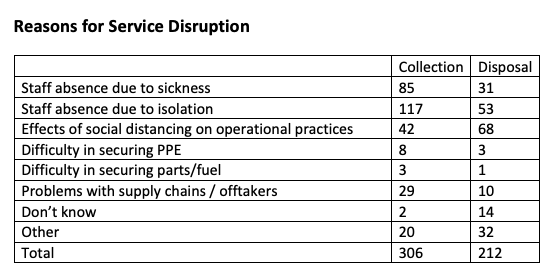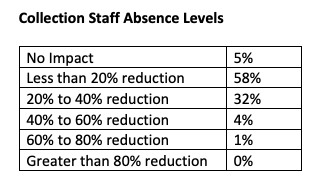Covid-19 causing waste service disruption, says ADEPT survey
The first results from an online survey for English local authorities to establish the impact of Covid-19 on waste and recycling services show the majority of services are continuing, but certain services such as garden and bulky waste collections have been hard hit.
The weekly survey, led by the Association of Environment, Economy, Planning and Transport (ADEPT) and launched on 31 March, received responses from more than 200 councils in two days, revealing a “mainly positive” picture of waste services across England.
Despite an average drop in staff numbers of an average of more than 20 per cent due to staff illness of self-isolation, 98 per cent of councils are running residual waste collections normally or with only minor disruption, followed by 93 per cent for recycling and 97 per cent for clinical waste collections.
However, services such as garden waste, food waste and bulky waste collections have experienced much higher levels of disruption. Only 41 per cent of garden waste collection services are operating normally, with 38 per cent withdrawn completely and 21 per cent experiencing some level of disruption.

63 per cent of food waste collections are continuing as normal, with 18 per cent experiencing minor disruption, and 18 per cent experiencing moderate to severe disruption or withdrawal.
Bulky waste collections have experienced the most significant disruption with nearly two thirds (65 per cent) of collections being withdrawn, and only 19 per cent operating normally. Just 20 per cent of street sweeping and litter services have been operating without disruption, with 72 per cent experiencing minor to moderate disruption.
The ADEPT survey, which has been supported by the Local Authority Recycling Advisory Committee (LARAC), the Local Government Association (LGA) and the National Association of Waste Disposal Officers (NAWDO), explained that staff absence was the main reason for disruption among collection authorities, with absence due to isolation the highest for 117 councils and staff absence due to sickness highest for 85 councils.
Disposal services
In terms of WDAs, most residual waste treatment services are running normally, with 93 per cent of Energy from Waste (EfW) and 97 per cent of landfill facilities operating normally, with seven and three per cent minor disruption respectively.
Meanwhile, 86 per cent of Waste Transfer Stations and 87 per cent of Mechanical Biological Treatment facilities are running normally, with 13 per cent of both types of facility experiencing minor disruption.
However, Household Waste Recycling Centres (HWRCs), Materials Recycling Facilities (MRFs) and open windrow composting facilities have experienced severe disruption.
Only two per cent of HWRCs remain open, with 77 per cent closed and 21 per cent experiencing severe disruption, such as reduced opening hours, while 46 per cent of MRFs have closed and a further 12 per cent are experiencing minor to moderate disruption. 65 per cent of WDAs have suspended the use of open windrow composting facilities, with just 24 per cent continuing to operate normally or with minor disruption.
HWRCs and MRFs have been hard hit by the government’s advice on social distancing, with HWRCs in particular closing to reduce contact between members of the public – the effects of social distancing on operational practices was the main reason given for disposal service disruption, with 68 WDAs citing this as the main factor.
‘Business as usual for most councils’
The safety of waste workers and the continuation of waste and recycling services has been a primary concern for the resources and waste industry since the outbreak of the Covid-19 pandemic. The network of organisations behind the survey issued a joint statement with commercial operators in the sector on 25 March calling on the public to play its part in reducing the spread of Covid-19 to operatives in order to minimise disruption to waste services.
Speaking on behalf of these organisations, Ian Fielding, Chair of ADEPT’s Waste Group, said: “I would like to thank all those who took time to respond and ask them to keep providing us with weekly updates. Their input is invaluable in enabling us to keep up with the rapidly changing developments across the country.
“So far, the picture is good. Although there has been some disruption, it seems to be business as usual for most councils on core services like residual waste and recycling collections.

“I’d like to pay tribute to our frontline workers who are providing an essential service. It is because of them and our officers that we are continuing to provide collections for our communities.
You can view the first results of ADEPT’s survey for the week commencing 30 March on the Association’s website.








